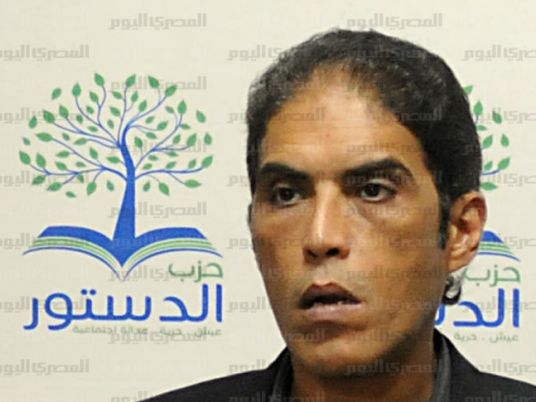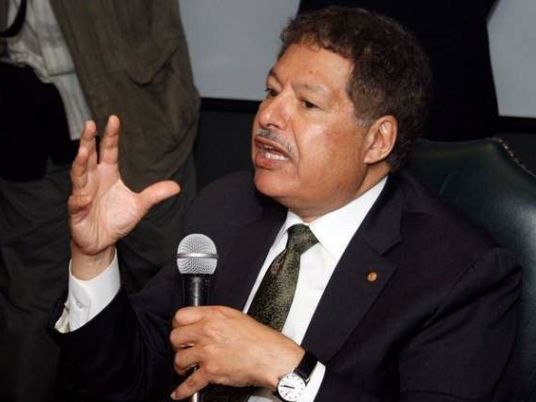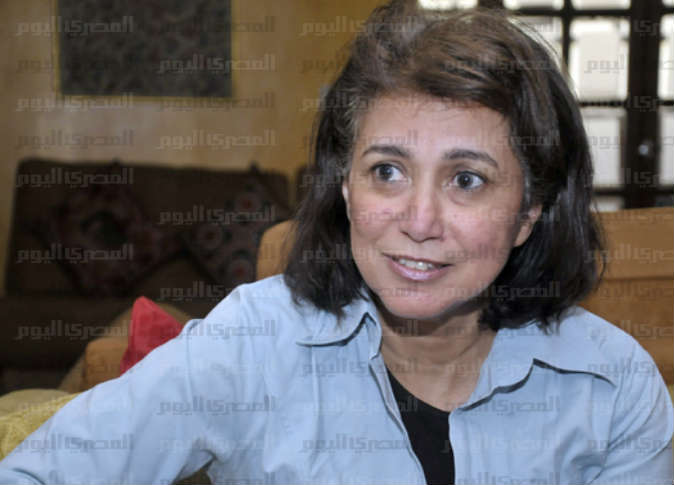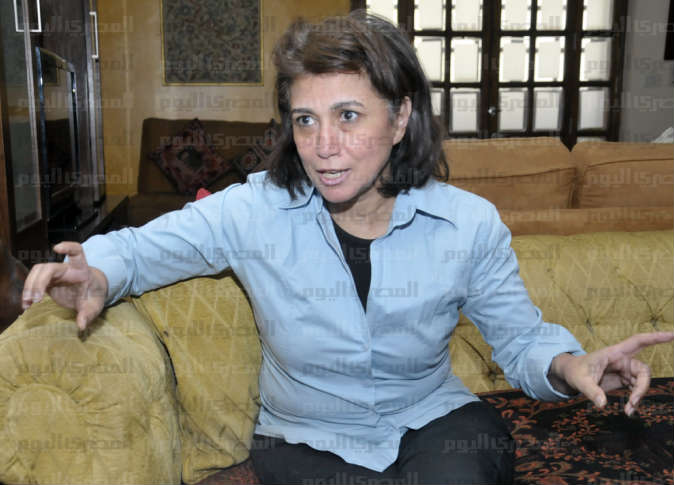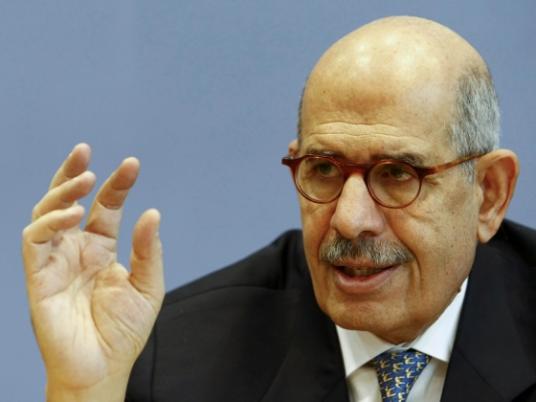
As Egypt’s pronounced generational divide increasingly challenges the dated and unavailing politics of the old guard, the post-uprising Dostour Party struggles with its own brand of pro-democracy youth.
The party, founded by reform leader Mohamed ElBaradei in April 2012, is at a deadlock yet again as its youth members continue to challenge their senior counterparts, exhibiting a contentious power struggle.
A group of 20 young Dostour Party members started an open-ended sit-in inside the party’s Cairo headquarters last week to protest internal mismanagement. The sit-in triggered a wave of resignations from the party’s Aswan branch.
Meanwhile, Emad Abu Ghazi resigned as the party’s secretary general Friday in light of the internal rifts.
Internal division
In his resignation letter, which was sent to Egypt Independent, Abu Ghazi said there are two ways to deal with internal conflicts.
“Either resolve [the problems] through the general conference or resort to dissent … in which case either take the necessary procedures toward the one at fault or eliminate one of the parties,” he wrote.
“I refuse to remain as a stumbling block that stands in the way of achieving the goals for which I accepted the position in the first place,” he continued.
Abu Ghazi told Egypt Independent that he only resigned from his position and not from the party altogether, and that he would continue to work with other party members to finish building it and enable its youth to participate in politics.
Meanwhile, in a statement late Monday commenting on the sit-in, Abu Ghazi said this was not the proper way to settle differences.
“What that group did is against the law,” he said. “They are occupying a public place that belongs to all party members.”
Abu Ghazi accused the protesters of seizing party documents, vowing to hold them accountable to party bylaws.
Despite Abu Ghazi’s resignation, which was one of the main demands, the demonstration continues. Hassan Mostafa, one of the members participating in the sit-in, told Egypt Independent that so far Abu Ghazi’s resignation is “hearsay” that they won’t acknowledge until the party issues an official statement.
“This is not the only demand, and it is not even confirmed yet,” Mostafa said. “We need proof.”
Mostafa said the sit-in would continue because protesters want more details about the resignation, such as who will replace Abu Ghazi.
The protesters demand a democratic bylaw regulating party administration and stricter rules regarding who may occupy leadership posts.
In their statement, the protesters said the party is witnessing a stumbling restructuring process.
“We had hoped that the party would achieve the revolution’s goals, but there have been attempts to destroy it,” the statement read. “We tried to work toward reform discreetly, but others mistook our discretion for weakness.”
The protesters said they had “passed on the torch” to Hossam Eissa, who resigned late last month as head of the steering committee.
Eissa resigned in protest. He expressed his respect for the party’s youth, who continue to stand against attempts by members who want to guarantee permanent positions inside the party.
“I was introduced to beautiful faces that gave me hope, and I was also introduced to ugly faces that rely on lying and forgery,” he said.
The protesters said they had trusted Eissa to “correct the path” inside the party, and their statement said “certain members” impeded Eissa’s efforts eventually leading to his resignation.
“Eissa’s resignation proved to us the lack of any real intentions from central leaders to build a party that reflects the revolution’s goals,” the statement read.
To the members protesting, Eissa’s resignation was the straw that broke the camel’s back. Mostafa said the fact that the reasons behind his resignation were not investigated raises a lot of questions in itself.
Accordingly, protesters called on ElBaradei to dismiss deputy party head Ahmed al-Boraie as well as Abu Ghazi, reject Eissa’s resignation, and finish the party’s structuring in line with electoral guidelines proposed by Eissa.
Mostafa lamented the rifts inside the party, which boasts democracy and the principles of the 25 January revolution.
“How can we sell a commodity that we don’t own?” he asked.
Commenting on the crisis, political analyst Hassan Nafea said that “the plague, which hits all political parties” manifested in personal agendas playing bigger roles than ideologies and political programs.
Old problems and new directions
In January, a group of young members also staged a sit-in at the party’s Alexandria headquarters following internal rifts within the party, highlighted by the death of Shaarawy Abdel Baqy Shaarawy, who fainted during a meeting with party leaders as he argued with Sameh Makram Ebeid, former organizational secretary of the party. Shaarawy died before he reached the hospital.
Shaarawy’s death amplified anger toward Ebeid, whose dismissal became a key demand.
The protesters had said the central members of the party had lost their legitimacy and that the party’s disregard of their demands would lead to escalation, since “there is no monopoly over the Dostour Party, which boasts democracy and freedom of speech.”
While party member Ahmed Hawary had fully acknowledged the problems plaguing the party earlier this year, he saw no need for the current sit-in.
Hawary attributed the party’s core problems to its ambiguous structure and the fact that the door for membership had not yet opened, leaving its members working on a voluntary premise.
This resonated with what Nafea described as a lack of organizational structure within parties. Nafea blamed the problem on the fact that “it is a new experience and because political activity has been put on hold for so long.”
But this is now changing, Hawary asserted.
Hawary said that following the January sit-in, party leaders took into consideration protesters’ demands, and members worked toward restructuring the party.
The door for membership is now open in most secretariats, he said, and elections are expected to be held before the party’s general conference.
While he agreed there are always minor internal problems, they are not the same rifts as claimed by the protesters, he said.
“Members are holding a sit-in for personal demands rather than noble ones,” he said.
Last week, the Dostour Party decided to form an independent committee to prepare for the party’s general conference and oversee internal elections in light of an initiative launched by the party’s youth.
The party also appointed activist and former Ghad Party member Gamila Ismail as its organizational secretary to be in charge of restructuring the remaining secretariats.
An official party statement confirmed that neither ElBaradei nor any other member of the party’s old guard would contest the upcoming elections to “give an opportunity to the party’s young cadres.”
Hawary saw this as a positive step and saw no need for the sit-in to continue.
“If you want democracy, you have to work toward democracy, but do not hold the party back,” he said.
The internal rifts fueled several rumors, chief of which is that ElBaradei himself would resign from the party.
Late last week, a Wafd Party spokesperson claimed that ElBaradei may join the Wafd Party or the Free Egyptians Party.
Wafd Party spokesperson Abdallah al-Moghazy said in a telephone interview with Nour al-Hekma satellite channel that ElBaradei may leave the Dostour Party due to the recent internal protests, adding that the Wafd Party would welcome any national figure who has not been involved with killing Egyptians.
However, Hawary vehemently denied these claims, saying ElBaradei would never leave the party.
But for Nafea, it is the very leadership of ElBaradei that is causing problems. Nafea argued rifts within the party arose because “ElBaradei doesn’t give political activity the attention it needs.”
He explained that the Dostour Party disappointed many who had pinned their hopes on a party led by ElBaradei to add to political life post-revolution. He added that ElBaradei doesn’t have the leadership skills to unite the party’s factions, and has neither the charisma nor the patience to limit the internal conflicts.
Meanwhile, protesters outlined a road map for the party to mend its rifts. The plan includes several steps, such as electing a temporary steering committee comprising nine founding members, forming a separate committee to oversee the elections and general conference, and investigating the reasons behind Eissa’s resignation.
In a statement Monday, the protesters expressed their full support for Ismail’s efforts in mending the rifts and following the guidelines set by Eissa in restructuring the secretariats through democratic elections.

